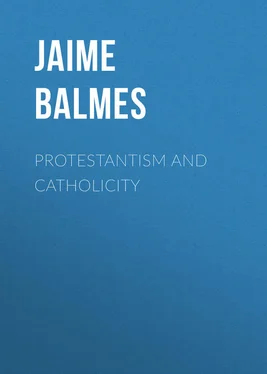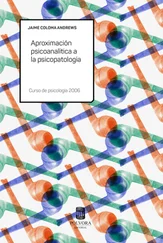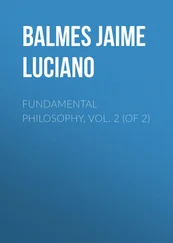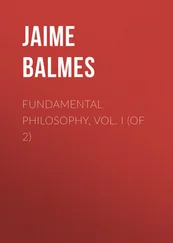Jaime Balmes - Protestantism and Catholicity
Здесь есть возможность читать онлайн «Jaime Balmes - Protestantism and Catholicity» — ознакомительный отрывок электронной книги совершенно бесплатно, а после прочтения отрывка купить полную версию. В некоторых случаях можно слушать аудио, скачать через торрент в формате fb2 и присутствует краткое содержание. Жанр: foreign_antique, foreign_prose, на английском языке. Описание произведения, (предисловие) а так же отзывы посетителей доступны на портале библиотеки ЛибКат.
- Название:Protestantism and Catholicity
- Автор:
- Жанр:
- Год:неизвестен
- ISBN:нет данных
- Рейтинг книги:3 / 5. Голосов: 1
-
Избранное:Добавить в избранное
- Отзывы:
-
Ваша оценка:
- 60
- 1
- 2
- 3
- 4
- 5
Protestantism and Catholicity: краткое содержание, описание и аннотация
Предлагаем к чтению аннотацию, описание, краткое содержание или предисловие (зависит от того, что написал сам автор книги «Protestantism and Catholicity»). Если вы не нашли необходимую информацию о книге — напишите в комментариях, мы постараемся отыскать её.
Protestantism and Catholicity — читать онлайн ознакомительный отрывок
Ниже представлен текст книги, разбитый по страницам. Система сохранения места последней прочитанной страницы, позволяет с удобством читать онлайн бесплатно книгу «Protestantism and Catholicity», без необходимости каждый раз заново искать на чём Вы остановились. Поставьте закладку, и сможете в любой момент перейти на страницу, на которой закончили чтение.
Интервал:
Закладка:
I avail myself of these examples to prevent a confusion of ideas; for in defending the cause of Catholicity, I have no need of pleading for oppression, or of applauding tyranny, or of approving the conduct of those who have trodden under foot men's most sacred rights. Yes, I say, sacred; for after the august religion of Jesus Christ has been preached, man is sacred in the eyes of other men on account of his origin and divine destiny, on account of the image of God which is reflected in him, and because he has been redeemed with ineffable goodness and love by the Son of the Eternal. This divine religion declares the rights of man to be sacred; for its august Founder threatens with eternal punishment not only those who kill a man, those who mutilate or rob him, but even those who offend him in words: "He who shall say to his brother, Thou fool, shall be in danger of hell-fire." (Matt. v. 22.) Thus speaks our divine Lord.
Our hearts swell with generous indignation, when we hear the religion of Jesus Christ reproached with a tendency towards oppression. It is true that, if you confound the spirit of real liberty with that of demagogues, you will not find it in Catholicity; but, if you avoid a monstrous misnomer, if you give to the word liberty its reasonable, just, useful, and beneficial signification, then the Catholic religion may fearlessly claim the gratitude of the human race, for she has civilized the nations who embraced her, and civilization is true liberty .
It is a fact now generally acknowledged, and openly confessed, that Christianity has exercised a very important and salutary influence on the development of European civilization; if this fact has not yet had given to it the importance which it deserves, it is because it has not been sufficiently appreciated. With respect to civilization, a distinction is sometimes made between the influence of Christianity and that of Catholicity; its merits are lavished on the former, and stinted to the latter, by those who forget that, with respect to European civilization, Catholicity can always claim the principal share; and, for many centuries, an exclusive one; since, during a very long period, she worked alone at the great work. People have not been willing to see that, when Protestantism appeared in Europe, the work was bordering on completion; with an injustice and ingratitude which I cannot describe, they have reproached Catholicity with the spirit of barbarism, ignorance, and oppression, while they were making an ostentatious display of the rich civilization, knowledge, and liberty, for which they were principally indebted to her.
If they did not wish to fathom the intimate connection between Catholicity and European civilization, if they had not the patience necessary for the long investigations into which this examination would lead them, at least it would have been proper to take a glance at the condition of countries where the Catholic religion has not exerted all her influence during centuries of trouble, and compare them with those in which she has been predominant. The East and the West, both subject to great revolutions, both professing Christianity, but in such a way that the Catholic principle was weak and vacillating in the East, while it was energetic and deeply rooted in the West; these, we say, would have afforded two very good points of comparison to estimate the value of Christianity without Catholicity, when the civilization and the existence of nations were at stake. In the West, the revolutions were multiplied and fearful; the chaos was at its height; and, nevertheless, out of chaos came light and life. Neither the barbarism of the nations who inundated those countries, and established themselves there, nor the furious assaults of Islamism, even in the days of its greatest power and enthusiasm, could succeed in destroying the germs of a rich and fertile civilization. In the East, on the contrary, all tended to old age and decay; nothing revived; and, under the blows of the power which was ineffectual against us, all was shaken to pieces. The spiritual power of Rome, and its influence on temporal affairs, have certainly borne fruits very different from those produced, under the same circumstances, by its violent opponents.
If Europe were destined one day again to undergo a general and fearful revolution, either by a universal spread of revolutionary ideas or by a violent invasion of social and proprietary rights by pauperism; if the colossus of the North, seated on its throne amid eternal snows, with knowledge in its head, and blind force in its hands, possessing at once the means of civilization, and unceasingly turning towards the East, the South, and the West that covetous and crafty look which in history is the characteristic march of all invading empires; if, availing itself of a favorable moment, it were to make an attempt on the independence of Europe, then we should perhaps have a proof of the value of the Catholic principle in a great extremity; then we should feel the power of the unity which is proclaimed and supported by Catholicity, and while calling to mind the middle ages, we should come to acknowledge one of the causes of the weakness of the East and the strength of the West. Then would be remembered a fact, which, though but of yesterday, is falling into oblivion, viz. that the nation whose heroic courage broke the power of Napoleon was proverbially Catholic; and who knows whether, in the attempts made in Russia against Catholicity, attempts which the Vicar of Jesus Christ has deplored in such touching language – who knows whether there be not the secret influence of a presentiment, perhaps even a foresight of the necessity of weakening that sublime power, which has been in all ages, when the cause of humanity was in question, the centre of great attempts? But let us return.
It cannot be denied that, since the sixteenth century, European civilization has shown life and brilliancy; but it is a mistake to attribute this phenomenon to Protestantism. In order to examine the extent and influence of a fact, we ought not to be content with the events which have followed it; it is also necessary to consider whether these events were already prepared; whether they are any thing more than the necessary result of anterior facts; and we must take care not to reason in a way which is justly declared to be sophistical by logicians, post hoc, ergo propter hoc : after that, therefore on account of it. Without Protestantism, and before it, European civilization was already very much advanced, thanks to the labors and influence of the Catholic religion; the greatness and splendor which it subsequently displayed were not owing to it, but arose in spite of it.
Erroneous ideas on this matter have arisen from the fact, that Christianity has not been deeply studied; and that, without entering into a serious examination of Church history, men have too often contented themselves with taking a superficial view of the principles of brotherhood which she has so much recommended. In order fully to understand an institution, it is not enough to remain satisfied with its leading ideas; it is necessary to follow all its steps, see how it realizes its ideas, and how it triumphs over the obstacles that oppose it. We shall never form a complete idea of an historical fact, unless we carefully study its history. Now the study of Church history in its relations with civilization, is still incomplete. It is not that ecclesiastical history has not been profoundly studied; but it may be said that since the spirit of social analysis has been developed, that history has not yet been made the subject of those admirable labors which have thrown so much light upon it in a critical and dogmatical point of view.
Another impediment to the complete comprehension of this matter is, that an exaggerated importance is given to the intentions of men, and the great march of events is too much neglected. The greatness of events is measured, and their nature judged of, by the immediate means which produces them, and the objects of the men whose actions are treated of; this is a very important error. The eye ought to range over a wider field; we ought to observe the successive development of ideas, the influence which they have exercised on events, the institutions which have sprung from them; but it is necessary to see all these things as they are in themselves, that is, on a large scale, without stopping to consider particular and isolated facts. It is an important truth, which ought to be deeply engraven on the mind, that when one of those great facts which change the lot of a considerable portion of the human race is developed, it is rarely understood by those who take part in it, and figure as the principal actors. The march of humanity is a grand drama; the parts are played by persons who pass by and disappear: man is very little; God alone is great. Neither the actors who figured on the scene in the ancient empires of the East, nor Alexander invading Asia and reducing numberless nations into servitude, nor the Romans subjugating the world, nor the barbarians overturning the empire and breaking it in pieces, nor the Mussulmen ruling Asia and Africa and menacing the independence of Europe, knew, or could know, that they were the instruments in the great designs whereof we admire the execution.
Читать дальшеИнтервал:
Закладка:
Похожие книги на «Protestantism and Catholicity»
Представляем Вашему вниманию похожие книги на «Protestantism and Catholicity» списком для выбора. Мы отобрали схожую по названию и смыслу литературу в надежде предоставить читателям больше вариантов отыскать новые, интересные, ещё непрочитанные произведения.
Обсуждение, отзывы о книге «Protestantism and Catholicity» и просто собственные мнения читателей. Оставьте ваши комментарии, напишите, что Вы думаете о произведении, его смысле или главных героях. Укажите что конкретно понравилось, а что нет, и почему Вы так считаете.












